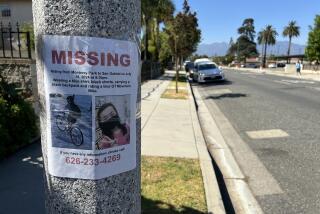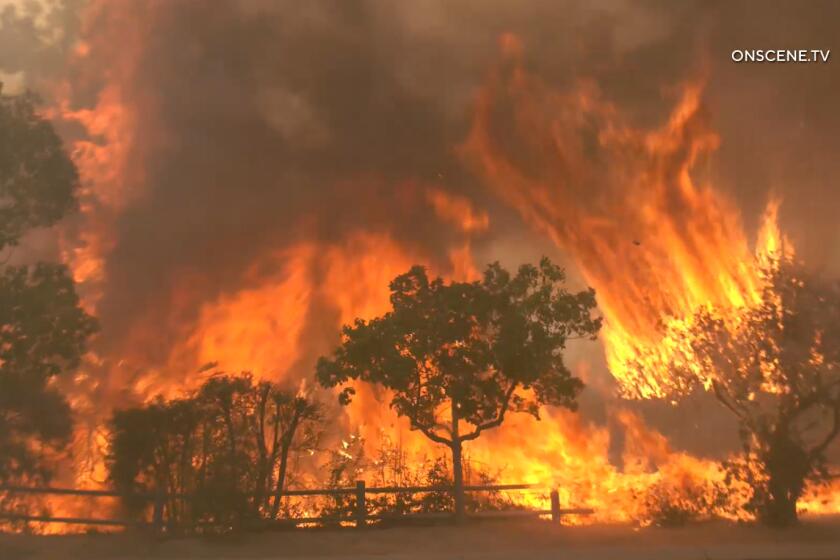A Child’s Place : The case of adopted Native American twins has raised issues of culture, law and parenting. At stake, the continuity of a people, the sanctity of the family--and the welfare of the girls.
When Karen Adams of West Covina saw the snapshot of the two black-haired babies with pink bows, she said she felt a flower blossom in her heart. They were her granddaughters, but she had never seen them because they had been given away to adoptive parents half a continent away.
No matter how well the couple cares for them, Adams, a descendant of Native Americans from a Northern California Pomo tribe, said the twins, now 2, don’t belong with outsiders. Her plaint drew national attention earlier this year when her tribe joined the twins’ parents in a lawsuit to get the children back. California appellate judges are currently considering the case.
“Indians believe your children are not just your possessions. Your children are the tribe,” Adams said. “Where they belong is here. I fiercely believe that.”
The case has raised the sensitive issues of transracial adoption and rights of biological parents who want their children back. But it has also triggered a national reassessment of how or even whether to protect modern descendants of the nation’s original inhabitants.
The Adamses’ ace card is a federal law, passed in 1978, to compensate for decades of deliberate separation and scattering of Native American families. That law gives Native Americans preference when Native American children need foster care or adoption.
The Adamses’ biggest obstacle is a growing argument that, now, some “assimilated” Native American families don’t qualify for protection.
In cases in which Native American children sent to non-Native American homes have later been identified as Native Americans, the foster parents are brokenhearted to find out the law requires them to relinquish the children, said Kathy Bridgeland, a family specialist with the Southern California Indian Center. “We hear things like, ‘Why are Indian people doing this? Why punish the child?’ ”
Bridgeland said half the time she is able to find Native American homes for the children. But in Los Angeles County, there are only eight certified Native American foster-care homes for an estimated 150 children needing them.
Nevertheless, she said most Native Americans feel “very strongly” that Native American children belong in Native American families where their culture is available. “Not in 15 years have I come across Indian people who feel any differently,” she said.
The feelings stem from historical family losses of staggering proportions. Prior to the year 1500, Native Americans numbered about 5 million in what is now the United States, but by 1900, they had dwindled to 250,000.
In California, a population of 100,000 declined by 85% between the start of the Gold Rush in 1849 and the turn of the century, largely due to massacres and disease.
Jim Cohen, volunteer attorney for the California tribe that has enrolled the twins, said, “A higher percentage of European Jews survived the Nazi Holocaust than California Indians survived the Gold Rush. When you put it in that perspective, it’s easy to understand why Indian people care about every child.”
Moreover, many Native Americans throughout the country still have fresh memories of the “boarding school” period that began in the late 19th Century and sanctioned the separation of parents and children, who were sent to boarding schools far from their homes. Some children were rounded up and taken against their parents’ wills. Some were beaten for speaking their native language in the schools.
Other Native American children were placed on farms in the East and Midwest to learn the “values of work and the benefits of civilization,” said Terry Cross, executive director of the National Indian Child Welfare Assn., a nonprofit service and advocacy organization in Portland, Ore.
“It was the expressed policy to remove the culture from the child as a way to solve what was then called ‘the Indian problem,’ ” he said. In the 1950s and ‘60s, the Child Welfare League of America in cooperation with the Bureau of Indian Affairs promoted the Indian Adoption project, based on the belief that Native American children were better off in non-Native American homes, he said.
Malcolm Margolin, publisher of the Berkeley-based “News From Native California,” said the adoptions were undertaken with the best intentions to lift children out of poverty and provide advantages of the dominant culture. “Among some religious groups, there was almost a recruiting effort to convince young Indian parents to give up their kids for the good of the child, that they were selfish for keeping the child,” he said.
By 1978, Congress found that state courts had removed one-quarter to one-third of all Native American children from their families and placed the majority into non-Native American homes, creating serious psychological problems for many children and devastating their families and tribes.
Rather than a race-matching law, the Indian Child Welfare Act acknowledges the rights of Native American tribes as sovereign governmental entities to intervene when Native American children are to be placed outside the homes, advocates said.
But still, they add, it is not uncommon for adoption agencies or social workers to circumvent the provisions of the Indian Child Welfare Act out of a lack of awareness, bias or, sometimes, to make money.
According to John Castillo, executive director of the Southern California Indian Center, “The problem with ICWA is that there’s no teeth in the act itself.” Lawyers and judges who disregard the act have not been punished, he said.
*
Neither Karen Adams nor her husband, Richard, were aware that their son Rick’s girlfriend, Cindy Ruiz, had given birth to twins in November, 1993, or that they had made plans to turn them over to Jim and Colette Rost of Columbus, Ohio. Rick Adams said at the time of the twins’ birth, he and Cindy, who already had two children, were so poor, embarrassed and ashamed that they didn’t want their parents to know about the adoption. He said he had the impression that if he left his ancestry off the forms, he could keep his parents from finding out.
But then, two months later, he said, “I couldn’t go on. I was deeply hurt. I had two daughters out there. I was in a lot of pain.” He went to his mother for help. She helped him draft a letter to her tribe asking for the twins back. In February, 1994, the attorney who had arranged the adoption notified the Rosts, who said they would contest any action.
Rick and Cindy said they have pulled themselves together sufficiently to parent the twins along with their two sons, Anthony, 4, and Ricky, 3. Now married and living in Long Beach, she works as a cashier, he is security officer.
The twins, named Bridget and Lucy by the Rosts, are living in Ohio. Cindy Adams said Anthony recently accused her of giving his sisters away. “I didn’t know what to say,” she said.
The Adamses and the Rosts maintain a cordial but wary relationship. They are united in blaming the situation, at least in part, on Beverly Hills attorney D. Durand Cook, who represented them both in the adoption proceedings, saying he knew about the twins’ Native American ancestry but did not reveal it. The Rosts said they have filed a lawsuit against Cook; Rick Adams said he is planning to file another. Cook declined to comment.
While the Rosts sympathize with the intent of the law, “We aren’t talking about a birth father who had a connection with his culture. This is not a Native American family unit,” Jim Rost said.
Some adoption advocates who say it’s time to amend the law want to narrow the definition of who is a Native American. Bill Pierce, president of the National Council for Adoptions, believes Native American children should be defined as those having 50% Native American blood. Rick Adams said Cindy’s father is also Native American, so the twins are one-eighth Pomo and one-quarter Yaqui, a tribe of the Southwest that is not federally recognized.
Pierce also believes that the act should apply only to those who live on a reservation and that tribes should not be allowed to intervene in voluntary adoption proceedings.
*
Karen Adams resents that the legal battle has focused on her degree of “Indian-ness.”
“Who are they to tell me I’m not an Indian?” she asked. Those who challenge her family’s claim to protection under the act base their definitions on old stereotypes, she said.
“It really irks me that I should live on a reservation and not speak English, or that they don’t think I should be allowed to eat at McDonald’s, or shop at the mall, or drive a car, or have a flush toilet.”
But it has also forced her to sort out what is “Indian” about her at this point. She and her husband Richard, who is not a Native American, have been married for 27 years and live on a quiet, well manicured, established suburban street. He is an electrician, she is a loan supervisor.
She does not call herself “assimilated.” “When you assimilate, you get absorbed. I’ve adapted,” she said. Both of Adams’ mother’s parents were officially registered members of a Pomo band, the Dry Creek Rancheria, outside Geyserville.
Adams grew up in the country outside Santa Rosa, where she watched her mother pound acorns in the traditional way. She remembers her parables about animals and nature. She recalls annual camping trips to the reservation and to the beach, where they harvested fish and seaweed.
Most of all, she considers herself part of an extended family. “When I was a kid and spent summers on the reservation, it wasn’t that I belonged to my mother,” she said. “I belonged to all my aunts, I belonged to my cousins.
Adams called the Rosts’ offers to expose Bridget and Lucy to their heritage well-meaning, but impossible. Their heritage, she said, is their family.
*
While public opinion has tended to side with adoptive parents in similar cases, the Adamses said they have received widespread support from Native Americans and other minorities.
Like many in the African American community, which has seen disproportionate numbers of its children go to adoptive and foster homes, many Native Americans lament the recent movement to strengthen transracial adoptions, saying it amounts to “cultural genocide.”
Adams said several Native Americans have come to the courtroom to offer their support and tell her timidly of their own disjointed experience being raised by Anglos.
But Pierce argues that cultures or even nations do not “own” their children. “We need to look at whether it is in the best interest of children to get good, competent parents, regardless of their culture or their skin color or their national origin,” he said.
In the case of the twins, even attorneys court-appointed to represent them disagreed on what is in their best interests. One believes they should be returned to the birth family; the other believes they should stay where they are.
*
Advocates worry that the Adams case will be used to eventually undercut protections for other Native American families, most of whom also live off reservations.
At least five states have begun chipping away at the Indian Child Welfare Act, by concluding that it does not apply to Native Americans who live off the reservation or those whose interest in their heritage is not sufficient.
In reaction to the Rost case, congressional legislators from Ohio have proposed amendments to the act that would make it more difficult to reclaim children after they have been placed and would weaken tribal court authority in voluntary placements.
Native American advocates say the amendments represent a major step back toward the type of abuses that gave rise to the law in the first place. They are at work drafting their own amendment that would force greater compliance with the act.
No matter how the legislators sort it out, Jim Rost said, “Any law that allows us to be tied up in this protracted litigation over an issue like this needs to be fixed.”
Karen Adams said she is constantly aware that how she defines herself may ultimately affect thousands of other Native American families. But regardless of how the case turns out, she said she knows her family will not be separated forever. Said Adams: “I have no doubt that Bridget and Lucy will come looking for us.”
More to Read
Sign up for Essential California
The most important California stories and recommendations in your inbox every morning.
You may occasionally receive promotional content from the Los Angeles Times.






